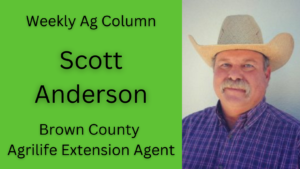
The annual Brown County Ag Day program is set for Monday, May 13, 2024. It will be conducted by Texas A&M AgriLife Extension Service in Brown County. The program will be held at the Adams Street Community Center.
Brown County Farm Bureau will sponsor an evening meal beginning at 5:30PM. The program will begin at 6:00pm. This year’s Ag Day program will focus on re-seeding pastures. Representatives from Tarleton State University and Turner Seed Company will present the program.
There will be a $10 registration fee (cash or check only) payable at the door. The Brown County Ag Day program is open to anyone interested. RSVP is requested in order for appropriate meal planning. To RSVP contact the Brown County Extension Office at 325-646-0386 by May 7th.
***
SHEEP & GOAT WEBINAR
We’re excited to invite you to our upcoming webinar addressing the Sheep and Goat Internal and External Parasites as well as Livestock Guardian Dogs, which will be held virtually on Thursday, May 2nd, 2024, at 12:00pm.
In this session, Dr. Jake Thorne, AgriLife Extension Sheep and Goat Specialist in San Angelo, Texas, will discuss parasite management followed by Bill Costanzo, AgriLife Extension LGD Specialist, will give an overview of the Livestock Guardian Dog Program.
Don’t miss out on this valuable opportunity to gain valuable information. Secure your spot today by registering through the following link: https://bit.ly/TSGE-MAY
We look forward to your participation!
***
Dove mortality occurring across Texas due to Trichomoniasis
The National Wildlife Health Center (NWHC) has confirmed several doves collected across Texas, including the Trans Pecos and Rolling Plains, tested positive for Trichomoniasis.
Trichomoniasis is an infectious disease affecting birds caused by a protozoan (single-celled) parasite, Trichomonas gallinae. It affects mostly pigeons and doves, but other species, such as finches, may also become infected. In addition, birds of prey feeding on infected doves may also become infected. The disease does not always cause mortality. Trichomonas gallinae does not pose a human health risk.
Generally, sick birds appear weak and have a “fluffed up” appearance. The parasite causes inflammation of the linings of the crop and mouth. As the disease progresses, affected birds have difficulty swallowing or breathing as the inflammation creates plaques which affect the airways and esophagus. Food and water sources, such as backyard bird feeders and birdbaths, can become contaminated from the mouths of infected birds.
TPWD recommends practicing appropriate biosecurity protocols to reduce wildlife contact with backyard flocks. If landowners see sick or dead doves or pigeons on their property, TPWD recommends discontinuing the use of bird feeders or bird baths until affected birds are gone from the area.
As a general best-practice, all bird feeders and baths should be cleaned frequently using a weak solution of household bleach (10% solution of sodium hypochlorite, or 1 part bleach to 9 parts water). Feeders and baths should be rinsed well and dried before re-use. It is recommended to periodically clean and disinfect bird feeders and bird baths, even if sick or dead birds have not been seen on property, as this can help prevent future disease outbreaks.
Use bird feeders that prevent the seed from getting wet. Bird seed exposed to rain or that becomes wet provides a more suitable environment for parasite survival.
Those who locate birds with signs consistent with Trichomoniasis should contact their local TPWD wildlife biologist.